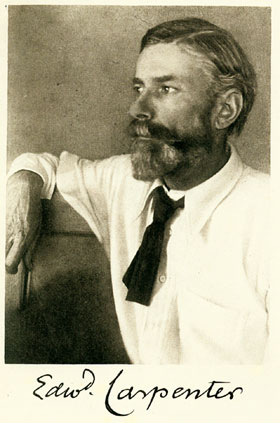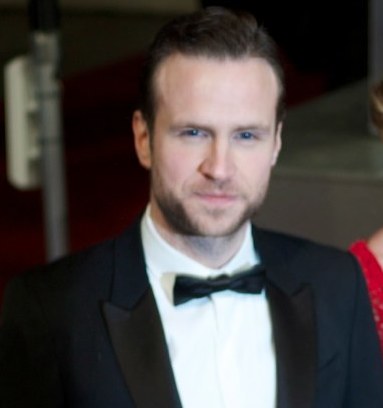User:Charlotteedwards12/sandbox
George Emerson
[edit]George Emerson is the Romantic Hero of the Bildungs Roman novel A Room With a View by E.M.Forster. George was raised by his father Mr. Emerson who taught him via a 'socialist'[1] ideology to challenge the Edwardian norms and thus George believes in Gender equality, left-wing politics and optimism. George works as a 'Railway' Clerk' [2] which immediately causes him to stand out from the upper class aristocrats, that are also guests in the Bertolini hotel, as Charlotte states that she would not have asked about his profession if she knew 'it would be such a dreadful answer'[3]. George appears first in the novel, but also in the 1985 and the 2007 television adaptations of Forster's A Room With a View, making his character relatively famous.
| George Emerson | |
|---|---|
| [A Room With a View (novel 1908) Geroge Emerson]] character | |
| In-universe information | |
| Occupation | Railway Clerk |
| Family | Mr. Emerson (Father), Mrs. Emerson (Mother, deceased),Freddy Honeychurch (Brother in law), Mrs. Honeychurch (Mother in law), Lucy Honeychurch (Wife). |
| Nationality | English |
Characteristics
[edit]Personality
[edit]George is a relatively shy young male who is described by Lucy Honeychurch as 'trustworthy, intelligent and even kind'.[4] As a Railway Clerk, his determination and hard-working nature indeed overshadow his introverted personality. However, with time George grows in confidence with the help of his beloved father Mr. Emerson and he eventually marries Lucy Honeychurch after a depressive period in which he thought he had lost Lucy to Cecil Vyse. However, Lucy also states that George's 'chivalry; his thoughts, his behavior, would not be modified by awe'[5] thus suggesting that George is a relatively ordinary character.
Appearance
[edit]George's appearance is not outwardly described, although the transition from boy to man is evident throughout the latter parts of the novel where George can be seen growing in both confidence and maturity. In both the 2007 film adaptation and the 1985 film adaptation, George is portrayed as having blonde hair, being clean shaven and most often wearing a suit.
The Creation of George Emerson
[edit]
Forster's creation of George Emerson was inspired by the utopian values advocated by Edward Carpenter, a socialist philosopher with radical views about equality and sexual tolerance.[6] These qualities are inherently significant to George Emerson as a character due to his ability to challenge and criticize social conventions. 'Edward Carpenter influenced various parts of Forster's writing, including Maurice' [7] but it was Edward Carpenter's personality, values and political stance that influenced Forster to give George the same characteristics.
Relationships
[edit]Mr. Emerson
[edit]George has good relationship with his father by means of how they look out for each other's best interests. Interestingly, there is a shift in parental authority from the beginning of the novel where Mr. Emerson gives orders to his son, this contrasts to the end of the novel where gentle encouragement becomes enough to support George socially and emotionally. It is evident that Mr. Emerson helps Lucy to come to terms with the romantic feelings that she has for George and without this, the two would likely have remained apart.
Lucy Honeychurch
[edit]George has an undoubtedly complicated relationship with Lucy, both romantically and non-romantically. Their first encounter is at the Bertolini Penthouse (Chapter one) where upon Lucy's arrival the guests sit down for dinner. As a gathering of upper class citizens, Mr. Emerson makes his own presence as well as his sons presence felt after his passionate outburst and slamming 'both fists on the table'.[8] This involved offering his room to Lucy as she and her cousin Charlotte Bartlett desired a room with a view, which they did not receive, after some persuasion from George, Charlotte and Lucy accept the offering.
There next meeting is in Chapter four at the Piazza Signoria. Lucy faints after seeing two Italian men fighting but George appears and by noticing Lucy's behavior he rushes over and catches her as she falls, the first instance of his role as a Romantic Hero is fulfilled. Lucy is initially quite embarrassed by this, but comes to thank him and realizes his kind nature, whilst noticing her first feeling of attraction towards him, George is oblivious to this.
George next meets Lucy at Fiesole and has an internal revelation about his physical and romantic attraction to Lucy. Unable to control his impulses any longer, he once again becomes the epitome of a Romantic Hero and kisses Lucy, thus rejecting all forms of Edwardian social and moral conduct. In fact, the kiss transgresses social boundaries so much that Lucy's cousin Charlotte offers the coach driver, who saw the embrace, 'a franc' [9] in exchange for his silence. [10]
After the vacation in Italy, the two did not hear from each other for a while as Lucy was in a romantic relationship with Cecil Vyse. However, The Emerson's move into Cissie Villa which is one of two estates owned by Sir. Harry Otway in Windy Corner, Tunbridge Wells, extremely close the residence of the Honeychurch family. During this time, Lucy rejects Cecil's proposal multiple times before agreeing to marry him and then cancelling last minute.
The last chapter moves forwards by some time, and shows George and Lucy in a romantic relationship, taking their honeymoon in 'the Pension Bertolini', [11]Florence,kissing on the window ledge of their room with a view. [12]
Charlotte Bartlett
[edit]Charlotte and George first meet upon arrival of the Bertolini and Charlotte immediately takes a disliking to the Emerson's purely based upon their social status. She throws derogatory terms towards them on multiple occasions and these vary from slandering Mr. Emerson's parenting techniques, to their appearance and even about Georges job as a Railway Clerk which Charlotte views as pitiful. Charlotte is effectively disapproving of George and Lucy's relationship as she believes that George is not of enough substance for Lucy, thus doing everything in her power to keep them apart.
Acquaintances
[edit]- Eleanor Lavish
- Cecil Vyse
- Sir. Harry Otway
- Freddy Honeychurch (Brother in law)
- Mrs Honeychurch (Mother in law)
- Miss Catherine Alan
- Miss Teresa Alan
- Mr. Beebe
Television and Film Adaptation
[edit]A Room With a View has been adapted into two major film adaptations with George being very close to the centre of each of them.
1985 Adaptation
[edit]The 1985 adaptation directed by James Ivory has Julian Sands cast as George Emerson. In this movie George is portrayed as having blonde hair, a clean shaven face and most commonly appears wearing suits.
2007 Adaptation
[edit]The 2007 adaptation directed by Nicholas Renton has Rafe Spall cast as George Emerson. He has dark blonde hair, is also clean shaven and often wears a suit or a waistcoat.

The Influence of George Emerson on Popular Culture
[edit]The ‘’The Divine Comedy’s'’ album Liberation actually uses a quote from George in the song titled ‘Death of a Supernaturalist’. The first phrase of the song being ‘My father says there is only one perfect view, and that's the view of the sky over our heads’[13] which is stated by George when in conversation with Cecil, thus demonstrating the significant impact of George as a figure in contemporary society.
George's Significance as a Working Class Male
[edit]George is one of the few working class characters in A Room With a view which is what allows him to fulfill the role of a 'Romantic hero' and seduce Lucy. Ultimately, with George being such an ordinary character it is possible that his character alone would have made the book more accessible to a wider group of people.
Memorable quotes for George as a Working Class Male
[edit]- ‘My father says there is only one perfect view, and that's the view of the sky over our heads’[14]
- 'He wanted to live now, to win at tennis, to stand for all he was worth in the sun—the sun which had begun to decline and was shining in her eyes; and he did win.'[15]
- 'He saw radiant joy in her face, he saw the flowers beat against her dress in blue waves. The bushes above them closed. He stepped quickly forward and kissed her.'
- 'Standing at at it's brink, like a swimmer who prepares, was the good man.' [17]
Notes
[edit]- ^ E.M,Forster, A Room With a View (London: Penguin English Library, 2012)p.9.
- ^ E.M,Forster, A Room With a View (London: Penguin English Library, 2012)p.67.
- ^ E.M, Forster, A Room With a View (London: Penguin English Library, 2012)p.67
- ^ E.M,Forster,A Room With a View (London: Penguin English Library, 2012)p.46.
- ^ E.M,Forster,A Room With a View (London: Penguin English Library, 2012)p.46.
- ^ Stephanie,Forward, 2016, A Room with a View: class, conventions and the quest for clarity, https://www.bl.uk/20th-century-literature/articles/a-room-with-a-view-class-conventions-and-the-quest-for-clarity#footnote2 [01/02/20]
- ^ Kate, Symondson, 2016, 'E M Forster’s gay fiction', The British Library website, https://www.bl.uk/20th-century-literature/articles/e-m-forsters-gay-fiction, Retrieved 11/02/2021
- ^ E.M Forster,A Room With a View (London: Penguin English Library, 2012)p.4.
- ^ E.M Forster,A Room With a View (London: Penguin English Library, 2012)p.73.
- ^ Lynne, Walhout Hinojosa, 'Religion and Puritan Typology in E. M. Forster's A Room with a View', Journal of Modern Literature, 33:4 (2010) pp.72-94 (p.79)
- ^ E.M Forster,A Room With a View (London: Penguin English Library, 2012)p.216.
- ^ Alex, Zwerdling,'The Novels of E.M Forster', Twentieth Century Literature, 2:4 (1957) pp.171-181 (p.174)
- ^ E.M,Forster, A Room With a View (London: Penguin English Library, 2012)pp.165-166
- ^ E.M,Forster, A Room With a View (London: Penguin English Library, 2012)pp.165-166
- ^ E.M,Forster, A Room With a View (London: Penguin English Library, 2012)p.163.
- ^ E.M,Forster, A Room With a View (London: Penguin English Library, 2012)p.70.
- ^ E.M,Forster, A Room With a View (London: Penguin English Library, 2012)p.70.
External Links
[edit]- ^ E.M,Forster, A Room With a View (London: Penguin English Library, 2012)
- ^ Forward, Stephanie, 2016, A Room with a View: class, conventions and the quest for clarity, https://www.bl.uk/20th-century-literature/articles/a-room-with-a-view-class-conventions-and-the-quest-for-clarity#footnote2 [01/02/20]
- ^ Symondson, Kate, 2016, 'E M Forster’s gay fiction', The British Library website, https://www.bl.uk/20th-century-literature/articles/e-m-forsters-gay-fiction, [11/02/2021]
- ^ Walhout Hinojosa,Lynne, 'Religion and Puritan Typology in E. M. Forster's A Room with a View', Journal of Modern Literature, 33:4 (2010) pp.72-94.
- ^ Zwerdling,Alex,'The Novels of E.M Forster', Twentieth Century Literature, 2:4 (1957)pp.171-181
